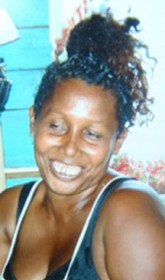Twenty-five-year-old Monica Carmichael, who expired after she delivered a still-born baby at the Georgetown Public Hospital (GPH) on Wednesday afternoon, died as a result high blood pressure coupled with a blood clot.
A relative of the young woman, who was the mother of a four-year-old girl and who lived at Number 30 Village, West Coast Berbice, yesterday said that her death certificate stated her cause of death as eclampsia and thromboembolism.
Eclampsia has been described as a life-threatening complication of pregnancy, which results when a pregnant woman previously diagnosed with preeclampsia (high blood pressure and protein in the urine) develops seizures or falls into a coma. Thromboembolism is said to be the formation in a blood vessel of a clot (thrombus) that breaks loose and is carried by the blood stream to plug another vessel. The clot may plug a vessel in the lungs (pulmonary embolism), brain (stroke), gastrointestinal tract, kidneys, or leg.
Carmichael’s relatives had said they were told by the hospital’s officials that she suffered three seizures and they were unable to revive her following the third seizure. The woman was transferred from the New Amsterdam Hospital to the GPH on Friday after it was found that her pressure was too high. She was told on Saturday that her baby had died but was never taken to the operating theatre until Tuesday when the baby was removed.
The woman’s cousin, Vanessa Carmichael, had told Stabroek News that she was wheeled out of the theatre on Wednesday morning and she had left her in good spirits that very afternoon and as such the family was shocked when she died later that day.

Meanwhile, Murtland Simmons, a brother of 38-year-old Marion Bristol of Mabura, who died after giving birth late Monday night at GPH, said that his sister died as a result of hyperthermia, shock and cervical laceration. Hyperthermia has been described as an elevated body temperature due to failed thermoregulation. It occurs when the body produces or absorbs more heat than it can dissipate. When the elevated body temperatures are sufficiently high, hyperthermia is a medical emergency and requires immediate treatment to prevent disability or death.
The man was upset that he was unable to witness the post-mortem examination of his sister’s body, which was performed on Thursday. He said he was told to arrive at the hospital’s mortuary at 7 am with $1,000 and a ball of cotton wool.
“I arrive since five in the morning and I went waiting there and it was not until after ten that a man from Sandy’s [funeral home] told me that the post mortem done and the body gone to the funeral home,” the man said.
He said he had already made arrangements for the body to be stored at Sandy’s. The brother said he was the one who had driven his sister to the Linden hospital and according to him she appeared to be in very good spirits. She was subsequently transferred to the GPH.
He recalled that he last spoke to her on the phone on Monday evening and she had indicated she was feeling a lot of pain and begged for someone to be with her.
“You see we are poor people and the hospital is suppose to be for people but this thing with them woman dying steady have to stop. If we had money I know my sister would still living today but I don’t have money, is a lil greens I does sell and mining,” the man lamented.
He said while the Ministry of Human Services and Social Security has assisted with the funeral, it was not enough as transporting his sister’s body to Mabura alone will be an enormous cost. He said his brother-in-law has since left for the mining site to do a “wash down to get lil money but he ent come back yet and now I hear the warden shut down the operation.

“I want them to investigate these deaths and I want the President to get involve, this must stop,” the man said.
Simmons said it is “very painful that my sister gone like that”. Bristol had six children.
A release from the GPH had said that around 9.50 pm on Monday Bristol started complaining of pain and she was bleeding profusely. Further, it was noted that she was in labour at the time and the bleeding continued which was deemed out of the ordinary. The hospital had also noted that Bristol had a history of having previously delivered by c-section, which poses an increased risk of bleeding during subsequent pregnancies. Her relatives have since said the woman delivered all her babies naturally.
“At this time, the patient was prepared for a CS in the theatre. However, labour was very hasty so she had to be delivered in the labour room (a healthy baby girl was delivered); at which time, the profuse bleeding continued and further complications were recognized – there was no visible afterbirth, the placenta was removed, but the bleeding still continued,” the GPH stated.
According to the hospital, the most senior staff was summoned and the patient was transported to the theatre but she began gasping for air before she arrived there.
“Resuscitation measures were performed for close to half of an hour, but to no avail. It is noteworthy that from the time of the patients first cry for pain to the time of her demise, no more than one and a half hours had elapsed,” the statement read.
The deaths of the Bristol and Carmichael have brought the number of women who had have died in childbirth to eight since September.





